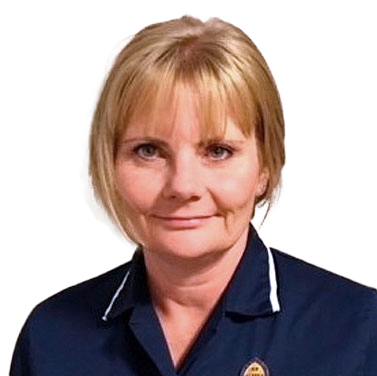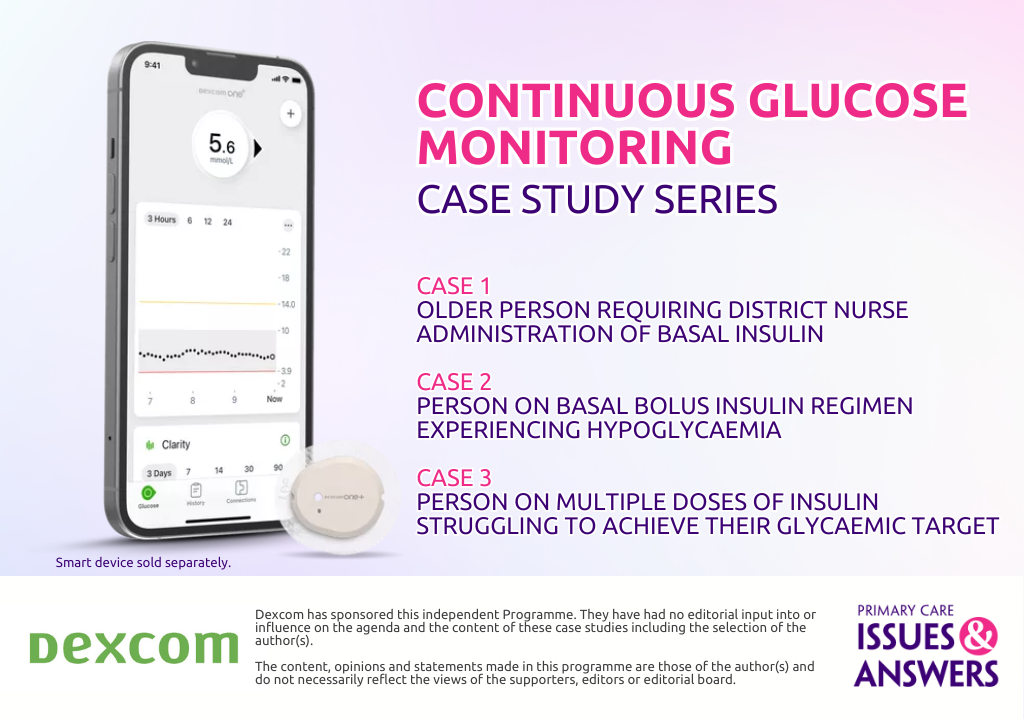NEW SERIES: Continuous Glucose Monitoring (CGM) Case Study Series
Continuous glucose monitoring (CGM) is a device that measures glucose levels in real time throughout the day and night, sending glucose levels to a receiving device (smartphone or receiver), providing alerts on highs and lows. It is a more user-friendly alternative to traditional finger-pricking.
How CGM works
- A small device is attached to the skin
- The device measures glucose levels in interstitial fluid, which is the fluid around cells
- The device can alert the user if glucose levels are too high or too low
How CGM can help
- CGM in T2D can help provide a better understanding of the effects of diabetes medications, nutrition and exercise on glucose levels1,2
- CGM sensors enable better long-term glucose management and a better quality of life† ‡ 3-7
- CGM Metrics and daily graphics help to gain insights into glucose fluctuations throughout the day that cannot be seen with a finger-prick diary*
- People using Dexcom CGMs see treatment successes that keep them motivated8
- Caregivers who support older people living with T2D in the use of technology, especially remote monitoring, may help to improve patient’s adherence to medication9
About this programme
These three cases have been developed by our experts – Su Down, Jane Diggle and Nicola Milne. They will provide the person’s medical notes before inviting you to take a virtual consultation with each patient.
Throughout these expert case presentations, interactive CPD question modules and reflection, you can test your knowledge on how to treat each case and consider the likely causes of the patterns seen in the ambulatory glucose profile before the experts offer the supporting evidence and explanation behind their suggested approach.
The aim of this programme is to cement for HCPs (who may not focus wholly on diabetes but are keen to broaden their knowledge, skills and competency) to support safe and appropriate initiation of CGM using the Dexcom ONE+ system along with expanding their understanding of the fundamentals by using the process of basic data interpretation in a step wise format.
Programme Agenda
Case 1: Older person requiring District Nurse administration of basal insulin
April 2025
The reason for choosing this approach is to provide confidence to see where medication escalation may be needed, with the supporting education regarding minimisation of hypoglycaemia. The belief is that all other learning tools address frailty with hypoglycaemia recognition, so this would look to address those where all the readings are high and confidence from the data, will allow for medication increases as appropriate.
Case 2: Person on basal bolus insulin regimen experiencing hypoglycaemia
May 2025
The purpose of this patient scenario is to address the relevance of medication related impact on glycaemic profiles. This will allow learning about the importance and impact of insulin dosing, carbohydrate awareness and measurement, timing of insulin, the impact of pre-blousing etc.
Case 3: Person on multiple doses of insulin struggling to achieve their glycaemic target
June 2025
The purpose of this patient scenario is to address the relevance of the impact of lifestyle related issues on glycaemic profiles. This will allow learning regarding the importance to recognise the impact of exercise planned or unplanned, effects of alcohol on glucose profiles, importance of good injection technique, forgetting injections etc.
Your experts for the series

Su Down
Diabetes Nurse Consultant,
Somerset

Jane Diggle
Specialist Diabetes Nurse Practitioner, West Yorkshire

Nicki Milne
Primary Care Diabetes Specialist, Manchester
Continuous Glucose Monitoring (CGM)
Case Study Series
Register now to access the patient cases when they come in for their consultations »
To learn more about Dexcom CGM systems, visit the Dexcom Website https://uk.provider.dexcom.com/
For further educational resources on Dexcom CGM, and clinical courses on diabetes care, register for the Dexcom Education Hub at https://uk-educationhub.dexcom.com/users/sign_up
This educational programme has been supported by:

Dexcom has sponsored this independent Programme. They have had no editorial input into or influence on the agenda and the content of these case studies including the selection of the author(s).
The content, opinions and statements made in this programme are those of the author(s) and do not necessarily reflect the views of the supporters, editors or editorial board.
* Compared to SMBG
† Quality of life outcomes are from a US-cohort of patients with T1 and T2 Diabetes Mellitus on intensive insulin therapy. N=248
‡ Quality of life outcomes reported include emotional burden, hypoglycaemic-related anxiety, avoidance and confidence
1. Weber KK, et al. High frequency of unrecognized hypoglycaemias in patients with Type 2 diabetes is discovered by continuous glucose monitoring. Exp Clin Endocrinol Diabetes. 2007;115(8):491-4.
2. Ajjan RA, et al. Continuous glucose monitoring for the routine care of type 2 diabetes mellitus. Nat Rev Endocrinol. 2024;20(7):426-440
3. Šoupal J, et al. Glycemic Outcomes in Adults With T1D Are Impacted More by Continuous Glucose Monitoring Than by Insulin Delivery Method: 3 Years of Follow-Up From the COMISAIR Study. Diabetes Care. 2020;43:37-43.
4. Martens T, et al. Effect of Continuous Glucose Monitoring on Glycemic Control in Patients With Type 2 Diabetes Treated With Basal Insulin: A Randomized Clinical Trial. JAMA. 2021;325(22):2262-2272.
5. Visser MM, et al. Effect of switching from intermittently scanned to real-time continuous glucose monitoring in adults with type 1 diabetes: 24-month results from the randomised ALERTT1 trial. Lancet Diabetes Endocrinol. 2023;11(2):96-108.
6. Gilbert TR, et al. Change in Hemoglobin A1c and Quality of Life with Real-Time Continuous Glucose Monitoring Use by People with Insulin-Treated Diabetes in the Landmark Study. Diabetes Technol Ther. 2021;23(S1):S35-S39.
7. Polonsky et al. Impact of CGM on Markers of QOL in Adults T1D Findings From DIAMOND RCT. Diabetes Care. 2017;40(6):736-741
8. Polonsky WH, Fortmann AL. J Diabetes Sci Technol. 2022;16(1):97-105
9. Seng JJB, et al. Role of Caregivers in Remote Management of Patients With Type 2 Diabetes Mellitus: Systematic Review of Literature. J Med Internet Res. 2023; 25:e46988





















